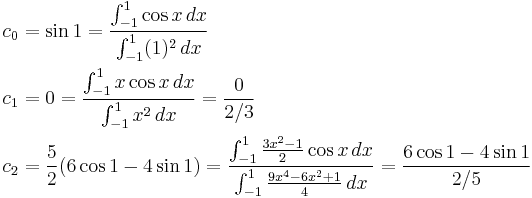Generalized Fourier series
In mathematical analysis, many generalizations of Fourier series have proved to be useful. They are all special cases of decompositions over an orthonormal basis of an inner product space. Here we consider that of square-integrable functions defined on an interval of the real line, which is important, among others, for interpolation theory.
Contents |
Definition
Consider a set of square-integrable functions with values in  ,
,
which are pairwise orthogonal for the inner product
where w(x) is a weight function, and  represents complex conjugation, i.e.
represents complex conjugation, i.e.  for
for  .
.
The generalized Fourier series of a square-integrable function f: [a, b] →  , with respect to Φ, is then
, with respect to Φ, is then
where the coefficients are given by
If Φ is a complete set, i.e., an orthonormal basis of the space of all square-integrable functions on [a, b], as opposed to a smaller orthonormal set, the relation  becomes equality in the L² sense, more precisely modulo |·|w (not necessarily pointwise, nor almost everywhere).
becomes equality in the L² sense, more precisely modulo |·|w (not necessarily pointwise, nor almost everywhere).
Example (Fourier–Legendre series)
The Legendre polynomials are solutions to the Sturm–Liouville problem
and because of the theory, these polynomials are eigenfunctions of the problem and are solutions orthogonal with respect to the inner product above with unit weight. So we can form a generalized Fourier series (known as a Fourier–Legendre series) involving the Legendre polynomials, and
As an example, let us calculate the Fourier–Legendre series for ƒ(x) = cos x over [−1, 1]. Now,
and a series involving these terms
which differs from cos x by approximately 0.003, about 0. It may be advantageous to use such Fourier–Legendre series since the eigenfunctions are all polynomials and hence the integrals and thus the coefficients are easier to calculate.
Coefficient theorems
Some theorems on the coefficients cn include:
Bessel's inequality
Parseval's theorem
If Φ is a complete set,
![\Phi = \{\varphi_n:[a,b]\rightarrow \mathbb{F}\}_{n=0}^\infty,](/2012-wikipedia_en_all_nopic_01_2012/I/7a909e0557a9ce077ece91cb446e5aa9.png)










